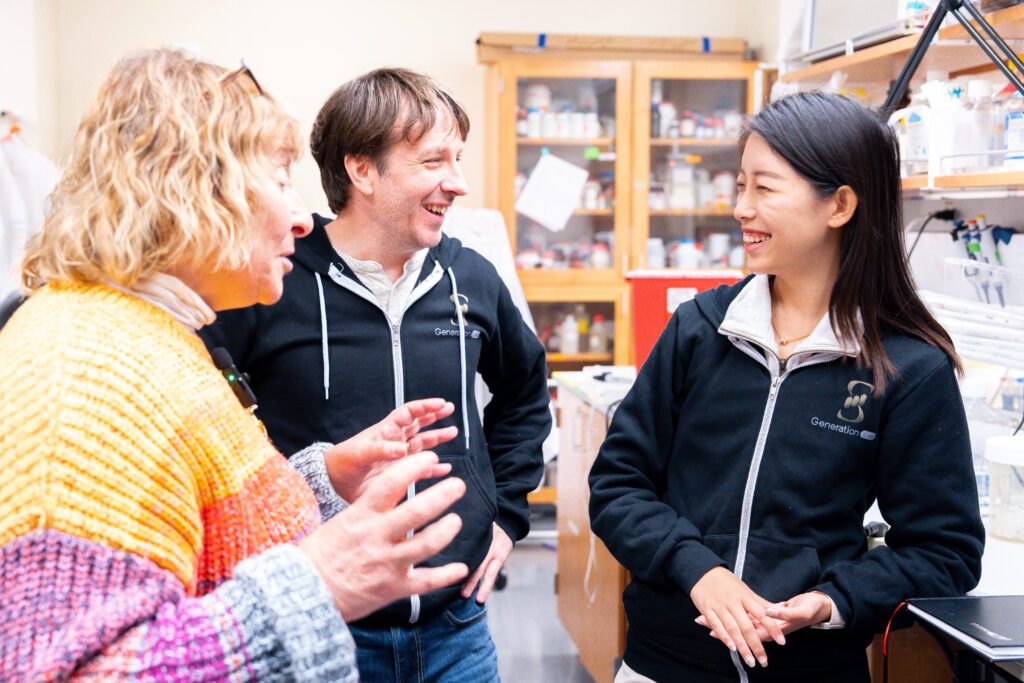SCET Alum Alina Su and University of California, Berkeley Bioengineering Professor Irina Conboy are co-founding Generation Lab with the Mission to Extend the Human Healthspan.
SCET Alum and former Collider Cup winner, Alina Su, and University of California, Berkeley Bioengineering Professor Irina Conboy are co-founding Generation Lab with the Mission to Extend the Human Healthspan – Waitlist for Its Clinically Driven At-Home Aging Test + Personalized Aging Intervention Opens Today
Generation Lab will offer the first test based on biomedical evidence that measures an individual’s biological age progression, officially launched today out of stealth. The company is announcing its pre-seed funding and the opening of its test kit waitlist.
Co-founded by Irina Conboy, a preeminent aging and longevity researcher from UC Berkeley, Generation Lab combines a simple cheek-swab test with proprietary techniques to definitively measure molecular disbalance that indicates aging and risk of disease. The company works with clinicians who can recommend personalized interventions, and Generation Lab can measure the effectiveness of these over time.

According to the CDC, six in ten adults in the US have at least one chronic disease and four in ten adults have two or more. Many of these are correlated with aging. These diseases are a major cause of morbidity and mortality and place a significant burden on our healthcare system. Catching these conditions early and preventing their progression can save millions of lives and billions of dollars. That’s what Generation Lab plans to do.
Unlike biological clocks, which are based on linear models that predict aging and disease by comparing a few people to each other, Generation Lab quantifies the actual biological age of each person through precise measurement of molecular biological noise – a key barometer of aging. Moreover, the biological age is quantified by Generation Lab for each function of the body: inflammation, regeneration, homeostasis, reproduction, etc. Generation Lab’s solution is based on peer-reviewed science – including groundbreaking research led by Dr. Irina Conboy, UC Berkeley, and published as a cover story in Aging in Sept 2023.
“Certain molecular disbalance causes degenerative diseases that flare up with aging,” explained Dr. Conboy, co-founder of Generation Lab, and Professor at University of California at Berkeley. “Generation Lab’s tests enable us to identify when a person has a proclivity towards certain conditions and suggest approaches that can help to attenuate, delay or even eliminate those risks. This paves the way to novel anti-aging medicine for identifying and treating diseases early – even when a person is pre-symptomatic – which leads to better outcomes.”
George Church, Ph. D., the Robert Winthrop Professor of Genetics at Harvard Medical School, is a renowned geneticist who is serving as an advisor to Generation Lab. “Irina and her team are taking cutting edge research straight out of the lab and applying it to a pressing issue: identifying disease much earlier than ever before possible using genetic markers,” said Dr. Church. “Seeing this unfold, and having a front-row seat to its impact, is going to be a pivotal moment in epigenetics – it’s incredibly exciting.”
Here’s how Generation Lab works:
- Obtain a test kit from a physician, clinic, or from Generation Lab directly.
- Open the kit and scan the QR code, selecting your level of membership (entry-level subscriptions start at about $400 per year for three tests).
- Follow the directions for a cheek swab and mail the sample back to Generation Lab in a pre-addressed envelope or return it to the clinician who provided the test.
- Within a few weeks, Generation Lab will provide a personalized report highlighting the status of your specific molecular aging markers, and offering a virtual call with a physician to review clinical and lifestyle interventions you might consider to slow the aging process or improve health.
- After subsequent Generation Lab tests, your clinician can review how effective each intervention was and its impact on your health and rate of aging.
Generation Lab’s other two co-founders are Alina Rui Su and Michael Suswal. Su, who studied longevity at Harvard Medical School and Berkeley, was previously founder and CEO of NovaXS. She serves as Generation Lab’s CEO, setting the vision and leading the company’s development. Suswal, who was previously co-founder and COO of tech startup Standard AI (where he remains on the Board), serves as COO, leading Generation Lab’s operations and commercialization efforts.
“As rejuvenation research expands, we need to focus on identifying the most effective measurement for aging. My passion in healthcare led me to focus on Aging & Regeneration since I was a researcher in Irina’s lab at Berkeley,” said Su. “Generation Lab’s technology has the potential to impact an 8-billion-person global population. We will be a one-stop shop for testing plus clinician recommendations for interventions with the ability to ship personalized products to your doorstep. I’m proud that we’re making it easy for people to take a more proactive role in their healthcare and better understand their risk of aging factors.”
Generation Labs has raised a pre-seed round from Transpose Platform and Sequoia China Founding Partner. The company expects its aging test kits to be available in Q1 2024. To join the waitlist, visit generationlab.co.
About Generation Lab
Generation Lab aims to extend the human healthspan with the first test based on clinically relevant biological evidence that measures individuals’ biological age progression and risk of disease so everyone can live longer, healthier lives. Co-founded by a preeminent aging and longevity researcher from UC Berkeley, Generation Lab combines a simple cheek-swab test with proprietary techniques to definitively measure molecular disbalance that indicates aging and risk of disease. The company works with clinicians who can recommend personalized interventions, and Generation Lab can measure the effectiveness of these over time. Join the waitlist at generationlab.co.